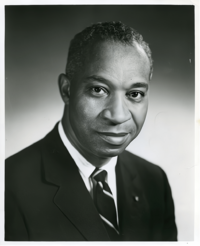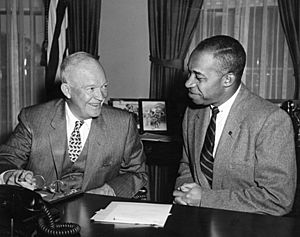E. Frederic Morrow facts for kids
Quick facts for kids
E. Frederic Morrow
|
|
|---|---|
 |
|
| Administrative Officer for Special Projects | |
| In office July 11, 1955 – January 20, 1961 |
|
| President | Dwight D. Eisenhower |
| Preceded by | Position established |
| Succeeded by | None |
| Personal details | |
| Born | April 20, 1909 Hackensack, New Jersey, U.S. |
| Died | July 19, 1994 (aged 85) New York City, New York, U.S. |
| Political party | Republican |
| Spouse |
Catherine Louise Gordon
(m. 1957) |
| Relations | John H. Morrow (brother) |
| Alma mater | Bowdoin College Rutgers University |
| Military service | |
| Allegiance | |
| Branch/service | United States Army |
| Years of service | 1942–1946 |
| Rank | Major |
Everett Frederic Morrow (born April 20, 1909 – died July 19, 1994) was a very important person in American history. He was the first African American to hold a high-level job at the White House. He worked for President Dwight Eisenhower as an Administrative Officer for Special Projects from 1955 to 1961.
Contents
Early Life and Education
Everett Frederic Morrow was born in Hackensack, New Jersey. His father, John Eugene Morrow, was a library worker who later became a minister. His mother, Mary Ann Hayes, worked on farms and as a maid. Everett's grandparents had been enslaved, which means they were not free.
He went to Hackensack High School and graduated in 1925. He was part of the debate team there for three years. His brother, John H. Morrow, also became a very important person. He was an Ambassador for the United States.
Morrow studied at Bowdoin College from 1926 to 1930. He was one of only two African American students there. He later graduated from the law school at Rutgers University.
Early Career and Military Service
In 1935, Morrow worked as a business manager for Opportunity Magazine. This magazine was part of the National Urban League. Two years later, he became a field secretary for the NAACP. The NAACP is an organization that works for civil rights.
During World War II, Morrow joined the United States Army. He started as a private in 1942. After only one month, he was promoted to sergeant. He later became an officer and left the army in 1946 as a Major of Artillery. After his military service, he worked as a writer for CBS.
Working at the White House
Everett Morrow helped with Dwight Eisenhower's presidential campaign in 1952. After Eisenhower won, Morrow became an adviser at the U.S. Commerce Department. Then, he moved to the White House. He became the Administrative Officer for Special Projects. This made him the first African American to hold such a high position there.
His time at the White House was important. He was the only African American on the staff during a time of big changes in civil rights. Events like the Supreme Court's Brown v. Board of Education ruling happened. This ruling said that separate schools for black and white students were illegal. There was also the Montgomery bus boycott and the Little Rock crisis. These events showed the struggles for equality.
Morrow often felt frustrated because the White House was very careful about civil rights. He lived when skilled African Americans were often kept from high-level jobs. Morrow wrote that his relationships with other staff members were "correct in conduct, but cold."
Morrow also helped Richard Nixon in his 1960 presidential campaign. He gave a speech at the Republican National Convention.
Life After the White House
In 1964, Morrow made history again. He became the first African American vice-president of Bank of America. He retired from the company in 1975. Everett Morrow passed away in 1994.
Books by Everett Morrow
After his time in politics, Morrow wrote several books about his experiences. His first book, Black Man in the White House, was published after the 1960 campaign. In this book, he shared his thoughts on working in the White House. He also wrote about the racism he faced in his personal and professional life. He mentioned times when people mistook him for a coat boy or a taxi driver.
In 1973, he published his first autobiography, Way Down South Up North. This book focused on racism in his hometown of Hackensack, New Jersey. After retiring, he published his last autobiography in 1980. It was called Forty Years a Guinea Pig: A Black Man's View from the Top.
Some of his important papers are kept at the Eisenhower Presidential Library. Others are at the Chicago Public Library.
Images for kids



